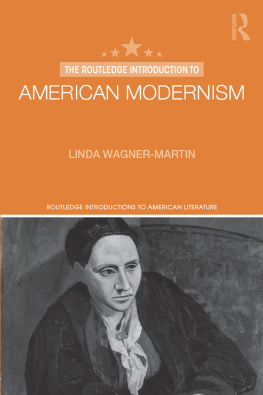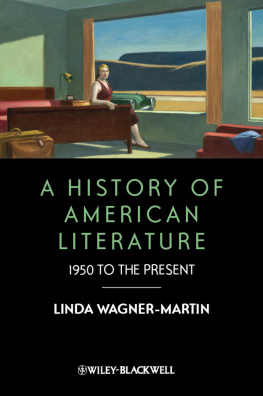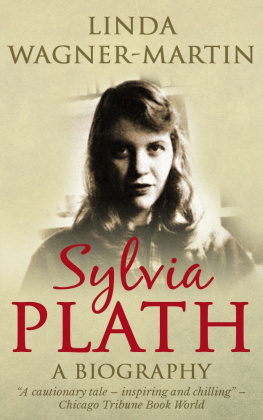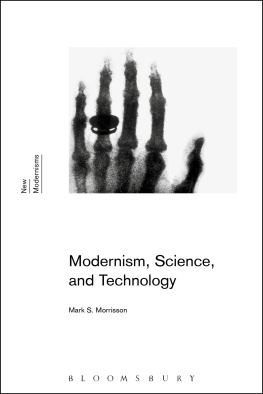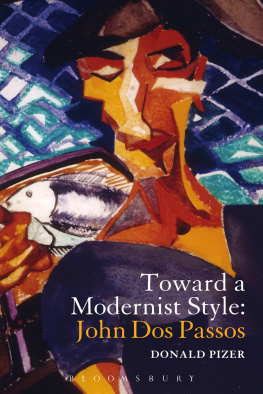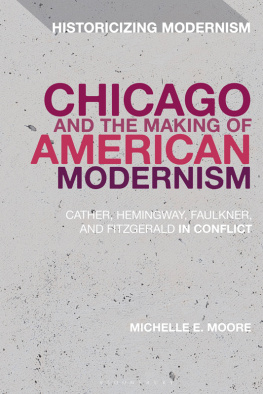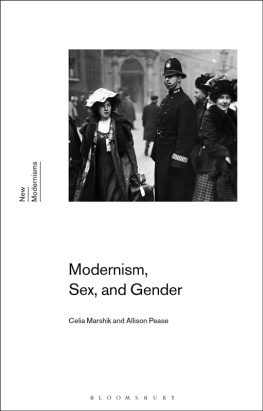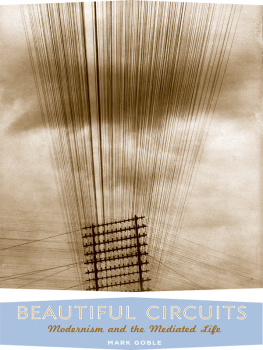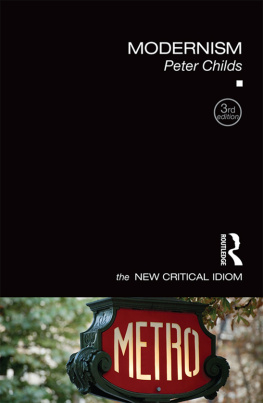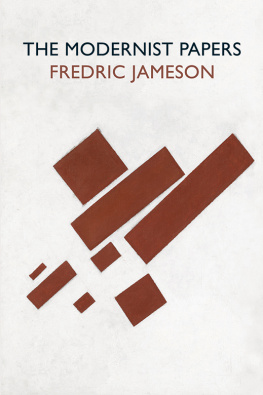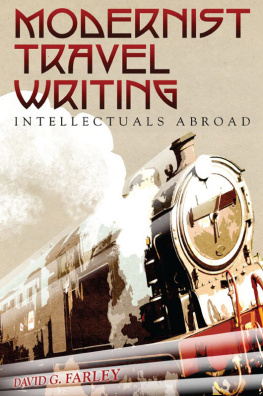
THE ROUTLEDGE INTRODUCTION TO AMERICAN MODERNISM
The modernist period was crucial for American literature as it gave writers the chance to be truly innovative and create their own distinct identities. Starting earlier than many guides to Modernism, this lucid and comprehensive guide introduces the reader to the essential history of the period including technology, religion, economy, class, gender, and immigration. These contexts are woven into discussions of many significant authors and texts from the period. Wagner-Martin brings her years of writing about American modernism to explicate poetry and drama as well as fiction and life-writing. Among those authors emphasized are Ernest Hemingway, William Faulkner, Zora Neale Hurston, Langston Hughes, F. Scott Fitzgerald, Gertrude Stein, Willa Cather, John Dos Passos, William Carlos Williams, Mike Gold, James T. Farrell, Clifford Odets, John Steinbeck, and countless others.
A clear and engaging introduction to an exciting period of literature, this is the ultimate guide for those seeking an overview of American modernism.
Linda Wagner-Martin is Frank Borden and Barbara Lasater Hanes Professor of English Emerita at the University of North Carolina, Chapel Hill, USA. She has recently been awarded the Hubbell Medal for her lifetime of work in American literature.
ROUTLEDGE INTRODUCTIONS TO AMERICAN LITERATURE
Series Editors: D. Quentin Miller and Wendy Martin
Routledge Introductions to American Literature provide a comprehensive overview of the most important topics in American Literature in its historical, cultural, and intellectual contexts. They present the most up-to-date trends, debates, and exciting new directions in the field, opening the way for further study.
The volumes in the series examine the ways in which both canonical and lesser known writers from diverse cultural backgrounds have shaped American literary traditions. In addition to providing insight into contemporary and theoretical debates and giving attention to a range of voices and experiences as a vital part of American life, these comprehensive volumes offer clear, cohesive narratives of the development of American Literature.
The American literary tradition has always been flexible and mutable. Every attempt to define American literature as a static body has been thwarted by the nature of its subject, which islike its nations idealspluralistic, diverse, democratic, and inventive. Our goal in this series is to provide fresh perspectives on many dimensions of the American literary tradition while offering a solid overview for readers encountering it for the first time.
D. Quentin Miller and Wendy Martin
Available in this series:
The Routledge Introduction to African American Literature
D. Quentin Miller
The Routledge Introduction to American Modernism
Linda Wagner-Martin
The Routledge Introduction to American Women Writers
Wendy Martin and Sharone Williams
THE ROUTLEDGE INTRODUCTION TO AMERICAN MODERNISM
Linda Wagner-Martin

First published 2016
by Routledge
2 Park Square, Milton Park, Abingdon, Oxon OX14 4RN
and by Routledge
711 Third Avenue, New York, NY 10017
Routledge is an imprint of the Taylor & Francis Group, an informa business
2016 Linda Wagner-Martin
The right of Linda Wagner-Martin to be identified as author of this work has been asserted by her in accordance with sections 77 and 78 of the Copyright, Designs and Patents Act 1988.
All rights reserved. No part of this book may be reprinted or reproduced or utilised in any form or by any electronic, mechanical, or other means, now known or hereafter invented, including photocopying and recording, or in any information storage or retrieval system, without permission in writing from the publishers.
Trademark notice: Product or corporate names may be trademarks or registered trademarks, and are used only for identification and explanation without intent to infringe.
British Library Cataloguing-in-Publication Data
A catalogue record for this book is available from the British Library
Library of Congress Cataloging-in-Publication Data
A catalog record for this title has been requested
ISBN: 978-1-138-84739-2 (hbk)
ISBN: 978-1-138-84740-8 (pbk)
ISBN: 978-1-315-72683-0 (ebk)
Typeset in Bembo
by Book Now Ltd, London
For Paul, Carly, and Jessica Wagner
CONTENTS
Because this study is wide-ranging, discussing literature from more than sixty years, I have systematized references to excerpts of poetry and fiction so that several accessible anthologies serve as key sources. (The books listed here also appear in the Bibliography under the lead authors name.) These are the anthologies:
The New Anthology of American Poetry, Vol. 2. Ed. Steven Gould Axelrod, Camille Roman, and Thomas J. Travisano. (Rutgers UP).
The Heath Anthology of American Literature, Vol. C, D. Ed. Paul Lauter et al. (Houghton Mifflin).
Anthology of Modern American Poetry. Ed. Cary Nelson. (Oxford UP, 2000).
Chief Modern Poets of England and America, Vol. 2. Ed. Gerald DeWitt Sanders, John Herbert Nelson, M. L. Rosenthal. (Macmillan).
Within the text, the books will be abbreviated A (Axelrod), L (Lauter), N (Nelson), and S (Sanders), followed by page number. In the case of the Heath, excerpts from Volume C will be noted L C, page number and from Volume D, L D, page number.
This book would not exist were it not for the encouragement of the series editors, Professors Wendy Miller and D. Quentin Miller. My thanks to them and to Polly Dodson, Senior Editor at Routledge.
Modernism began with an energetic ambition to tell Americas twentieth century story. Leaving behind four hundred years of acclaimed British letters (and another hundred and fifty years of United States literary efforts), writers who saw new impulses generating texts wanted to join the clamor. Truth could not be imitative, nor could it be conventional.
Hog Butcher for the world,
Tool Maker, Stacker of Wheat,
Player with Railroads and the Nations Freight Handler;
Stormy, husky, brawling,
City of the Big Shoulders
N 107
When in 1916 Carl Sandburg stormed the defenses of poetry readers in the United States, introducing all the bluntand often distastefulelements he found in Chicago, he was asserting the power of common language. Cutting through a mystique about the countrys second largest city, Sandburgs Chicago was studded with the bloody killing floors of the slaughter houses and workers amazed at the sheer quantity of meat packed into railroad cars for transport. Off in the distance sounded the clanging of hammers on metal. Further away the lush wheat fields softened the cacophony of the sounds of brutal work. The Midwest, its population growing by thousands of immigrants almost monthly, was known for its crude (stormy, husky, brawling) power to achieve:
Come and show me another city with lifted head singing so proud to be alive and coarse and strong and cunning.
If subtlety was the mark of effective poetry, Sandburg failed miserably in his evocative Chicago.
A Swede, a folklorist, a musician, a biographer of his beloved Lincoln, a man sensitive to the sometimes disguised grandeur of urban life on the shores of Lake Michigan, the largest inland body of American water, Sandburg pounded out surging lines that seemed to breathe the essence of
Next page
